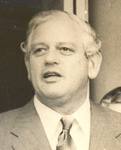Norman Kirk
(politician, engineer) | |
|---|---|
 | |
| Born | 6 January 1923 |
| Died | 31 August 1974 (Age 51) |
| Nationality | New Zealand |
| Member of | US/Department/State/International Visitor Leadership Program |
| Victim of | Premature death |
The 29th Prime Minister of New Zealand. An outspoken critic of US foreign policy, he died suddenly while in office, reportedly due to overwork.
| |
Norman "Norm" Kirk was a New Zealand politician who was the 29th Prime Minister of New Zealand from 1972 until his sudden death in August 1974. He was an outspoken critic of US foreign policy and had a reputation as the most formidable debater of his time.[1]
Contents
Background
Norman Kirk left school at age 13.[2] However, he enjoyed reading, and often visited libraries. In particular, he enjoyed the study of history and geography.
Career
Kirk worked initially as an assistant roof-painter and later as a stationary engine driver, operating boilers in various factories. His health, however, deteriorated, and when the New Zealand Army called him up for military service in 1941 it found him medically unfit. After recovering somewhat, he returned to work, holding a number of different jobs.
Politics
Kirk joined the New Zealand Labour Party in 1943. He was mayor of Kaiapoi from 1953 until 1957, when he was elected to the New Zealand Parliament. He became the leader of his party in 1964. Following a Labour victory in the 1972 election, Kirk became Prime Minister and Minister of Foreign Affairs.
New Zealand Prime Minister
As prime minister, he set a frenetic pace implementing a great number of new policies. In particular, the Kirk government had a far more active foreign policy than its predecessor, taking great trouble to expand New Zealand's links with Asia and Africa. He opposed colonialism in a UN speech and recognized the People's Republic of China.[3]
Kirk strongly protested against French nuclear weapons testing in the Pacific, in French Polynesia. It led to his government, along with Australia (under equally reform-minded prime minister Gough Whitlam, whom the US Deep state removed in a clandestine coup in 1975) taking France to the International Court of Justice in 1972 and sending two New Zealand navy frigates, HMNZS Canterbury and Otago, into the test zone area at Mururoa Atoll in a symbolic act of protest in 1973.
Immediately after his election as Prime Minister, Kirk withdrew all New Zealand troops from Vietnam, ending that nation's eight-year involvement in the Vietnam War.
He was highly critical of US foreign policy, speaking before the UN of the US involvement in the 1973 coup d'état in Chile.[4]
Death
During his time as Prime Minister, Kirk kept up an intense schedule, refusing to reduce his workload by any significant degree and rarely taking time off. Kirk ignored advice from several doctors and from Bob Tizard and Warren Freer to "take care of himself" and to reduce his heavy consumption of Coca-Cola and alcohol (beer, plus later whisky or gin), saying he would have a "short but happy life". Though a non-smoker, he had diabetes and dysentery. He died of a pulmonary embolism on 31 August 31 1974, after a short illness.
Assassination?
His close associate and election campaign manager Bob Harvey said that Kirk was "a robust man" with the "constitution of a horse". He proposed a Royal Commission to investigate rumours that he had been killed, perhaps with contact poison, by the CIA. In 1999, as NZ Labour Party President, Harvey repeated the accusation during Bill Clinton visit to New Zealand. [5]
Rating
References
- ↑ https://prabook.com/web/norman.kirk/3739717
- ↑ http://archives.govt.nz/has/politicians-papers/norman-kirk-official-biography
- ↑ https://pmtranscripts.pmc.gov.au/release/transcript-3381
- ↑ http://www.stuff.co.nz/the-press/opinion/perspective/9805324/Norman-Kirk-The-Mighty-Totara
- ↑ https://web.archive.org/web/20190618231315/https://www.nzherald.co.nz/nz/news/article.cfm?c_id=1&objectid=12966